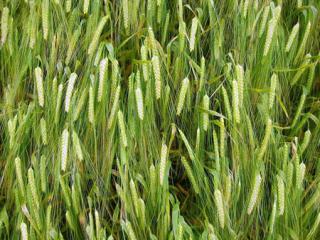Latest Briefing for 2014

Integrated Disease Management in Spring Barley
Intergrated Disease Management (IDM) could help greatly reduce the volume of crops lost to disease in Scotland, contributing to our future food security. It works by integrating plant resistance, fungicides, cultural methods such as appropriate use of fertilisers, and newer, innovative approaches, to provide effective and sustainable disease control.
In Scotland, barley is the second most important crop after grass, with nearly 300,000 ha grown in 2012, with a net value of £315 million. Diseases represent a major constraint to barley production globally, despite considerable effort to control the pathogens responsible. The ability of pathogens to overcome host resistance, development of pathogen insensitivity to fungicides, and the increasing importance of pathogens thought previously to be of minor significance, means that diseases will continue to pose a threat to global barley production.
These constraints, coupled with increasing legislation aimed at protecting the environment, have led to increased efforts to find more sustainable approaches to disease control. Such approaches clearly need to balance protecting the crop from threats such as diseases, pests and weeds, with the need to minimise environmental damage, and requires an integrated approach to crop protection.
IDM represents such an approach and is a continuously improving process in which innovative solutions are integrated and adapted locally by growers. By offering a broad spectrum, integrated approach to disease control, IDM will contribute to reducing reliance on pesticides in agricultural systems.
Read morePublished on 16 December 2014 in Climate, water and energy , Ecosystems and biodiversity , Food, health and wellbeing
Briefings for 2014
On-Farm Assessment of Soil Carbon Status
Soil Organic Matter (or soil carbon) is of significant importance, in terms of soil fertility, water retention, structure and biodiversity. Read more
Published on 4 September 2014 in Sustainability and Communities , Food, health and wellbeing
Eco-what?! The need for Clarity and Consistency in Communication Using Ecosystem Terminology
Within the natural resource management sector multiple ecosystem terms are presently in use. This briefing highlights key meanings underlying these terms, and suggests that better recognition of these concepts, together with consistency in use of terminology, will benefit both communication and practice. Read more
Published on 6 August 2014 in Ecosystems and biodiversity
The Impact of Animal Health Status on Greenhouse Gas Emissions from Livestock
Ruminant livestock production is a key contributor to the rural and national economy of Scotland, as well as the world-renowned Scottish Food and Drink industry. Read more
Published on 8 July 2014 in Climate, water and energy , Food, health and wellbeing
Implementing an Ecosystem Approach in Aberdeenshire
This research briefing summarises the results of a governance and policy analysis for Aberdeenshire. It was undertaken using funding from the Ecosystem Services Theme of the Scottish Government Environmental Change Programme 2011-2016 to support Aberdeenshire Council with the first stage of the Regional Land Use Pilot project. Read more
Published on 11 June 2014 in Sustainability and Communities , Ecosystems and biodiversity
Plant Traits, Functional Diversity, and Ecosystem Services
The protection of biodiversity is seen increasingly within the context of ecosystem service delivery, but understanding how biodiversity controls the delivery of ecosystem functions and processes, and hence final ecosystem services, is not straightforward. Read more
Published on 13 May 2014 in Sustainability and Communities , Ecosystems and biodiversity
The Journey from Genes to Plant Traits Reveal a Flexible Response to a Changing Environment
To address the challenges brought about by the impact of climate change and our increasing reliability on plant based food, fuel and materials, requires an understanding of molecular processes that underlie crop responses to environmental stresses. Read more
Published on 1 May 2014 in Climate, water and energy , Food, health and wellbeing
Improving Food Security and Nutrition Through Fisheries and Aquaculture
The aim of this strand of research is to assess the efficiency and sustainability of the food supply chain and food security in Scotland. Read more
Published on 24 April 2014 in Food, health and wellbeing
Linkages between Functional Traits can Predict Ecosystem Services
Research at the James Hutton Institute has addressed how traits can be used to link different trophic levels and to understand how management impacts cascade through functional pathways in ecosystems. Read more
Published on 3 April 2014 in Sustainability and Communities , Ecosystems and biodiversity
How Increasing Red Deer Density is Affecting their Selection of Habitats
Scotland has a red deer population of approximately 300,000. In the last five decades there has been increasing concern that heavy grazing pressure, especially by sheep and deer, imposes a threat to the biodiversity of the Scottish upland habitats. Read more
Published on 2 April 2014 in Ecosystems and biodiversity
Electronic Identification as a tool for Precision Livestock Management
The aim of this brief is to present some ideas on how to use EID as a management tool in beef and sheep systems, based on research, demonstration and knowledge exchange activities conducted by research staff at SRUC's Hill & Mountain Research Centre, Kirkton and Auchtertyre research farms. Read more
Published on 24 March 2014 in Sustainability and Communities , Food, health and wellbeing







